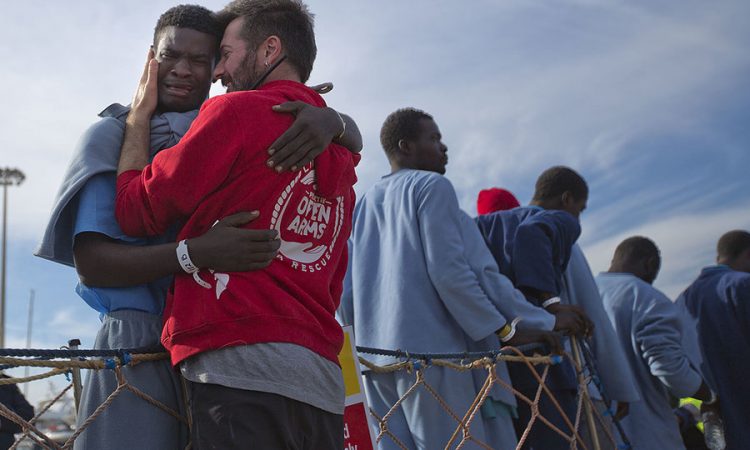ROME — Every weekday afternoon, lawyer Iacopo Maria Pitorri leaves his office for a few minutes to offer legal advice to a crowd of migrants waiting for him outside Rome’s Termini Station.
“My colleagues don’t want these people to come into the office so I come downstairs,” Mr. Pitorri says.
Not far away, in Piazza Venezia, a group of security guards is trying to prevent another illegal occupation of a building that the police had violently evicted at the end of August. “We’re getting rid of all the” Africans, one of them says, continuing on in insulting language that produce laughter from the others.
Around the square, Romans shudder when asked about migration. In the outskirts of Rome, at a makeshift camp that is home to hundreds of migrants and refugees, volunteer Adelaide Massimi reflects on the mood shift in Italian society regarding the migration issue.
“All the newspapers talk about now is Muslims raping women and children dying from malaria brought to Italy by African migrants. People are attacking Doctors without Borders on social media for helping migrants. Something is changing in Italy,” says Ms. Massimi.
Italian society has traditionally welcomed migrants, but the tide seems to be turning as Italians grow increasingly polarized on the issue. The public’s support for an open-door policy has dropped significantly in the past 12 months, and anti-immigrant parties won major gains in local elections this year. They seem set to repeat that performance in national elections in 2018.
As sympathy for migrants wears thin and the far-right gains ground, centrist political leaders have yielded to the increased pressure to take a tougher stance. Rome’s assistance to the Libyan coast guard, whose vessels return refugees to prisons where forced labor, torture, and rape are commonplace is part of that shift. Other efforts include pursuing administrative action against Italians who help illegal migrants and imposing a code of conduct on charities rescuing refugees in the Mediterranean Sea, making their mission more difficult.
“What’s surprising is that these new measures were put in place by a center-left government. There’s a perfect storm right now in Italy – the public debate stigmatizes migrants, political decisions are bad and left-wing leadership adopts right-wing populism,” says Grazia Naletto of Lunaria, a nonprofit organization that chronicles incidents of racism in Italy.
A terrible country for migrants?
In September 2016, 43 percent of Italians were in favor of welcoming and integrating migrants arriving here. Less than a year later, only 33 percent agreed with that attitude, according to a survey by Italian polling company SWG. While the number of migrants arriving has dropped significantly in recent months, the authorities have struggled to cope with the half million who have entered the country in the past three years, while new asylum seekers arrive every month.
The public’s pushback has had political ramifications; in June’s local elections, anti-migrant politicians surged and left-wing strongholds shifted to the right for the first time in decades. Also in July, a new anti-Islam political party was created to “fight against the Islamization of Italy,” according to Stefano Frassinelli, a journalist and co-founder of the movement. In the latest opinion polls for the general election in 2018, the far-right Northern League is poised to win 16 percent of the vote.
The sharp turn from warm welcome to cold shoulder is proving hard for arrivals like Medhanie M., who within six months of his arrival in Rome as am Eritrean refugee was told to leave the center that had given him assistance. He was later evicted from the building in Piazza Venezia. “Italy is a terrible country if you’re a migrant or a refugee,” Medhanie says. “Imagine you welcome a guest at your house and you give him water, the WiFi code and you make him feel OK. Then you throw him out the window. That’s how Italy treats us.”
For some, the evictions over the summer hit a nerve about migration and the lack of support for asylum seekers once they have entered the country.
“The problem is not in the number of migrants arriving, but in the fact that Italy has been dealing with migration flows from an emergency perspective for the last 20 years. There’s not a strategy to really integrate and accommodate these people in the long run,” says Ms. Naletto.
‘A strange change of heart’
For others on the right, Italy has reached a breaking point.
“We’ve been dealing with migration since the ’90s. No politician wanted to talk about it for years, but now there are entire neighborhoods where Italians are a minority. Not to mention the bigger problem of terrorist attacks in Europe, even though Italy has been spared so far. Italians, Europeans are being replaced and we need to stop this,” says Lorenzo Fiato, coordinator of Generazione Identitaria, the Italian branch of Generation Identity, an anti-immigration and anti-Muslim group that aims to stop mass migration to Europe.
This summer, Generazione Identitaria tried to stop a Doctors Without Borders rescue ship from leaving port. Although they didn’t succeed in doing so, the group has been successful in raising money to continue targeting NGOs that rescue the migrants.
In Piazza dell’Immacolata, where a multi-ethnic crowd used to assemble to play music, Valerio Capoccia, who owns a design store in the center of Rome, sits in confusion looking at an empty square.
“Migrants are not here anymore because Romans would be staring at people thinking they were possible terrorists. Italians didn’t use to fear a different face. Maybe 20 percent of us thought like that before. Now, everyone that comes to my store talks about how afraid they are there’s going to be a terrorist attack,” Mr. Capoccia says.
“Maybe the hostility had always been here and it’s only now reaching the surface,” he suggests. But making things worse, he adds, is the fact that “there’s no politician bucking the trend. It’s a strange change of heart. I never expected this to happen in my country. We’re losing our minds.”





